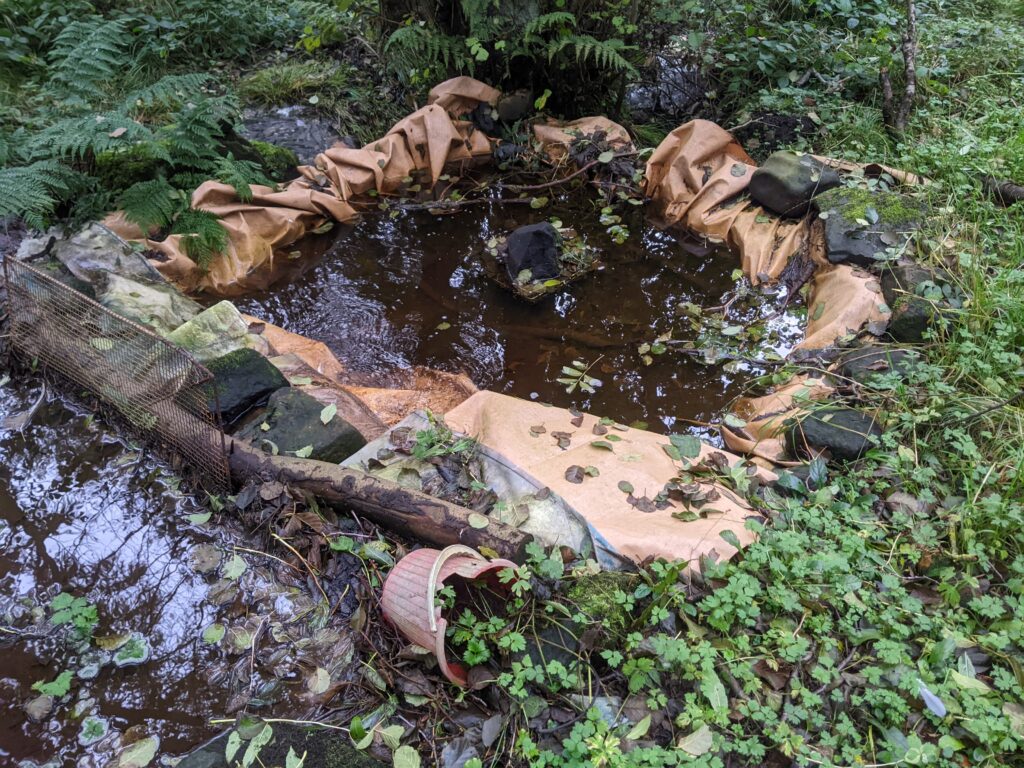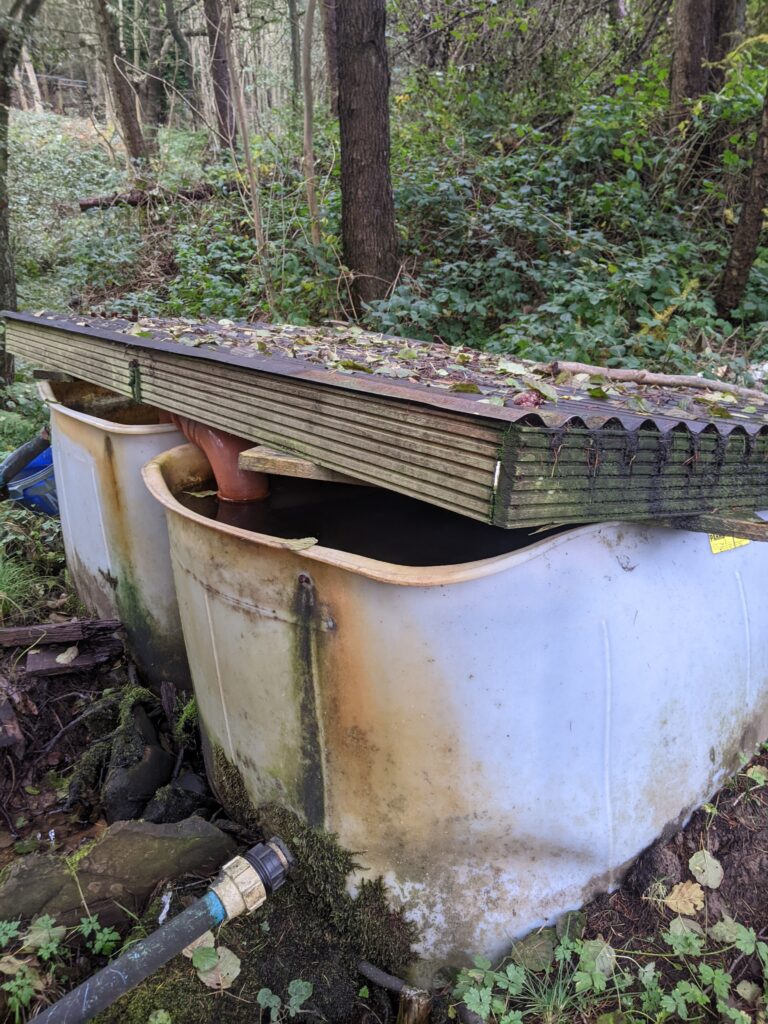Difficulties in securing funding for the remediation of a long standing failing supply
Introduction
This case study concerns a private water supply in North Yorkshire which serves a row of nine cottages, collectively called “Aysdalegate.” The supply presents a potential danger to human health as it is of risk of ingress from microbial pathogens by virtue of E. coli detections in samples collected from the supplied houses. The local area was once mined for iron and its dissolved presence is obvious in the source water, making it brown in colour and unwholesome. It is at further risk of becoming insufficient during dry periods too.
The Regulations allow enforcement notices to be served on relevant persons to facilitate improvements for any failing private water supplies by the local authority. On occasion, a particular set of unique circumstances can lead to intractable difficulties in establishing a long-term solution to mitigate the potential public health risk that they present to those that consume it.
The most common reason is funding of a possible solution, which prevents remedial action taking place, as no one is prepared to take responsibility for this cost. This impasse may arise for a variety of reasons; from disputes over supply ownership and incumbent responsibilities, or in this case, the high costs to bring it up to modern standards of supply or to connect the consumers to a public supply system.
The situation at Aysdalegate illustrates well the following common issues associated with cases of this nature:
- High costs for remedial work, (either treatment or connection to a licensed water supplier’s network) which the users refuse to pay for.
- Disagreements or uncertainties over where the responsibility for necessary work lies and associated costs.
- Unsustainable long and risky restriction of use notices to secure a wholesome supply.
- Ongoing public health risks to consumers until a solution is enacted such as from drinking unboiled water and increased risk of scalding to those having to boil their water.
Supply details
The source serving the Aysdalegate cottages is a rural stream, situated in a wooded area on a moorland slope. The water from this stream is captured in a makeshift pool lined with tarpaulin and then piped to two rudimentary settlement tanks with ill-fitting handmade lids. It is then distributed via a single closed tank, without any treatment to remove the hazards upstream to the properties, via pipes made from alkathene. None of these materials are of modern standard or approved for transmission of drinking water. Access for maintenance is very difficult and impossible for some.
Supply risks
The Aysdalegate supply was first risk assessed by the local authority in July 2013. It identified various unacceptably high-risk hazards between the poorly protected supply source and the points of consumption within each property. These collectively presented a notable contamination risk. This conclusion had already been verified on multiple occasions from 2013 onwards. Regular detections of faecal indicator bacteria were present in samples. In addition, other parameters, such as iron and colour had breached their respective regulatory standards.
Risk mitigation
To address the identified risks in 2013, residents were advised by the local authority to boil their water before consuming it. In 2015 three options for improving the supply were informally put to the cottage residents by the local authority. This included a connection to the local public water supply system. All were rejected by the residents on cost grounds.
It is a requirement for local authorities to serve a regulation 18 notice on relevant persons when a supply is considered to present a potential danger to human health. In this instance a notice was served by the local authority, but not until December 2017, two years after improvement options had been considered and rejected on financial grounds. The notice instead formalised advice already given, that the occupiers must boil their water prior to consumption until the local authority was satisfied that the risk to health had been mitigated. Unfortunately, this does not meet the full requirements that are set out in regulation 18, which requires other action that is necessary to protect human health and restore the quality of the water supply. It also causes a further ongoing health and safety risk of scalding for those residents until this notice is rescinded.
The notice, which required the consumers to boil their water, was still in place in 2023, six years after it had been issued.
Parliamentary debate
On 5 September 2023 the costs of mains water connections for rural communities were the subject of Parliamentary debate in Westminster Hall. This was brought before the house by Sir Simon Clarke, Member of Parliament (MP) for Middlesbrough South and East Cleveland. This was a direct consequence of the plea by his constituents at Aysdalegate to assist with their predicament. The need for Government funding to meet the high costs of main connections in exceptional cases of this nature was debated.
The debate acknowledged an ongoing research project that the Inspectorate had commissioned to review the effectiveness of the existing legislation related to private water supplies. This is due to be completed in the first quarter of 2024.
Site visit
In November 2023 inspectors visited the Aysdalegate supply with the local authority. Also in attendance were Sir Simon Clarke (MP), the local councillor, representatives of the residents and the owner of the land on which the supply is situated. In advance of this visit, inspectors had provided the local authority with a list of potential supply and treatment options.
Inspectors concluded that the supply was not fit for purposes and presented a significant danger to human health. The local authority was advised to issue a new regulation 18 notice to require improvements in the short and medium terms, as well as citing a final long-term solution. Any replacement private water supply should include appropriate robust multi barrier treatment measures, including disinfection arrangements. Inspectors also advised that suitable measures should be informed by the latest risk assessment, which at the time of the visit was still in progress. Sampling programmes must also take account of the risk assessment and include any relevant parameters, which might include for example, Cryptosporidium oocysts.


A problem persists however, in that whatever form of remedial work is agreed upon, its cost is likely to be several tens of thousands of pounds. The Inspectorate has suggested that funding from a DHLUC Shared Prosperity Fund should be investigated by the local authority.
Resolution of the issues that this case study illustrates are ongoing. The case study will be updated as further developments unfold.
Summary points and learning
- The requirement to serve a regulation 18 notice when a potential risk has been identified is mandatory and must be complied with in full.
- A regulation 18 notice must be served in a timely manner. If it is not, consumers remain at risk for unacceptably long periods.
- Any person that is aggrieved by a notice served under regulation 18 may appeal to the magistrate’s court within 28 days of serving a notice. The way forward will be decided at the discretion of the magistrate.
- Local authority risk assessments must be timely, robust, and acted upon appropriately in accordance with the regulations.
- Sampling programmes must take account of the risk assessment.
- The sourcing of funding for remedial measures in cases of this nature remains a problem.
